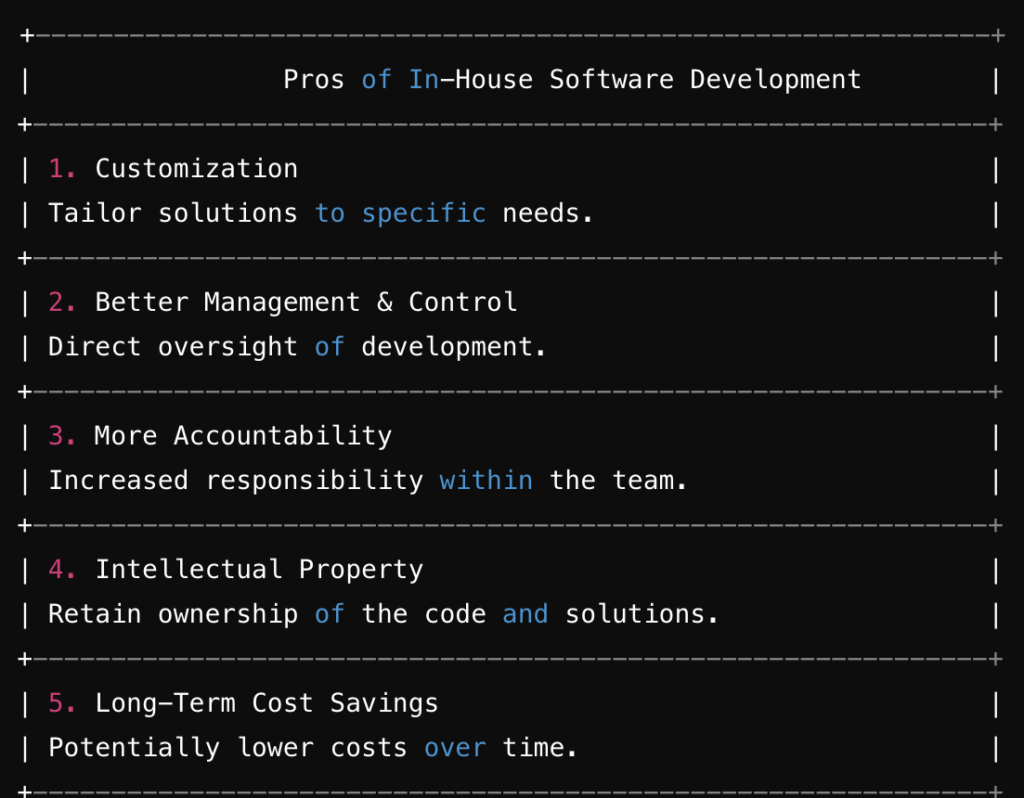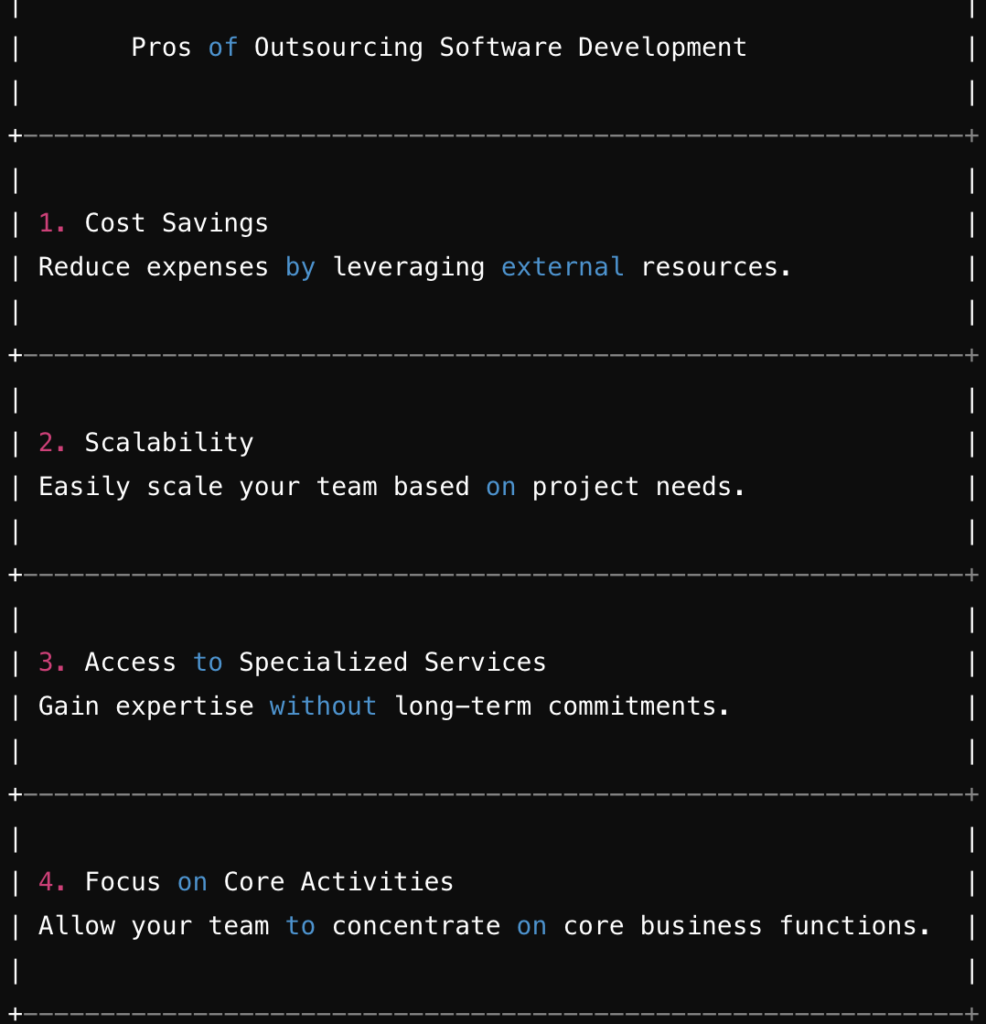For SMBs and startups choosing between in-house software development and outsourcing, both paths have distinct impacts on project success. In-house teams provide direct control, better communication, and stronger product understanding, though they require higher investments in salaries, benefits, and technical infrastructure. While outsourcing can be cost-effective and offer quick access to skilled developers, a survey done by the Compuware Corporation found that it can often compromise software quality and development speed. As Kris Manery, Senior Vice President and General Manager, Mainframe Solutions, Compuware put it simply: “However, as the research shows, there is a growing frustration that outsourcers are failing to meet expectations. Because there is no means to easily transfer application knowledge to the outsourcer–and to verify code quality and performance when it is delivered–application quality suffers, thus undermining any potential savings.”
So, which strategy works best when it comes to scaling your IT team? Outsourcing? In-house development? Are there better alternatives?
The decision should be based on several key software development factors:
- Project complexity and technical requirements
- Available budget for development tools and infrastructure
- Flexibility and Scalability
- Security requirements and data sensitivity
- Project Alignment and Company Culture
What is In-House Software Development?
In-house software development refers to the practice of establishing and maintaining a dedicated team of software developers in your organization to create and maintain applications, tools, and solutions.
This approach involves directly hiring and managing technical professionals who work exclusively for your company, aligning their efforts with business goals and objectives.
Instead of using third-party companies or contractors, organizations handle the entire software development lifecycle internally.
Pros and Cons of In-House Software Development
It’s always key to examine the entire scope of each strategy to determine which best suits your needs.
Here are the main advantages and disadvantages of in-house software development:
| Pros | Cons |
| Customization | Lack of specialization |
| Better management | Overhead expenses |
| More accountability | Reduced talent pool |
| Intellectual property | Struggle to find the right candidate |
| Long-term cost savings |
Pros of In-House Software Development

1. Customization
In-house development allows organizations to design software that aligns perfectly with their business processes. This ensures that the software addresses the exact pain points, challenges, and opportunities that the organization faces.
Additionally, with in-house development, the organization can adapt the software quickly as business needs evolve. Changes can be implemented without relying on external vendors or dealing with the limitations of pre-built solutions.
2. Better Management & Control
A key benefit of insourcing is that companies have full control over the development process, allowing them to manage priorities, make quick changes, and align the software with their strategic objectives.
3. More Accountability
In-house development teams are accountable because their actions directly impact the organization they are a part of.
They are closely connected to the company’s mission, values, and strategic objectives. This alignment encourages a stronger sense of ownership and responsibility toward achieving the organization’s goals.
4. Intellectual Property
The organization retains complete ownership of the developed software, which can lead to better protection of intellectual property and competitive advantage.
By keeping software development in-house, the organization can better control security measures and ensure that sensitive information and business processes are kept confidential.
5. Long-Term Cost Savings
With in-house development, organizations don’t have to pay recurring licensing fees for third-party software or services. Once the software is developed, the organization can use it without ongoing license costs.
Additionally, Off-the-shelf solutions might require costly customizations to fit specific business needs. In-house development allows organizations to create software that meets their exact requirements from the start, reducing the need for additional customization expenses.
Cons of In-House Software Development
1. Lack Of Specialization
In-house software development teams are often tasked with building a wide range of software solutions to support the organization’s operations and objectives.
While in-house teams can be flexible and adaptable, they might lack specialized expertise in certain areas.
2. Overhead Expenses
In-house development requires significant investments in terms of time, money, and skilled personnel. Hiring, training, and retaining developers can be costly.
Even costs that might seem “minor,” such as devices or coffee machines, accumulate, impacting your finances.
When you have an in-house IT team, you need usually need to cover:
- Office space and utility
- Equipment and software
- Salaries and benefits
- Recruitment and training
- Management and administration
- Security measures
This, however, can be balanced and significantly reduced with remote work.
3. Reduced Talent Pool
Finding a local individual possessing the exact skill set you need can be challenging, particularly when seeking highly specific or niche capabilities. At times, the local talent pool may not fully align with your requirements.
However, when you’re looking for specialized developers or individuals with specific skill sets, outsourcing or hiring remote software developers can offer a more streamlined process.
4. Struggle To Find The Right Candidate
If developers have an offer from another company that lets them work remotely at the same pay that you’re offering, they will reject you. The REAL perks for a developer are not a social setting and a coffee machine at work.
According to a study from HR Dive, 43% of programmers said that the ability to work remotely is a must-have when they are seeking a new job or considering an offer.
This is why you must seriously consider hiring a remote in-house development team. You stay in a win-win situation where your company enjoys an accountable team, and the developers get to work from wherever they wish to.
What is Software Development Outsourcing?
Software outsourcing is the practice of delegating software development and maintenance tasks to external third-party service providers. This strategic approach enables companies to access specialized expertise, reduce costs, and focus on their core business operations. Outsourcing can take various forms, including onshore, nearshore, or offshore, depending on the company’s specific needs and objectives.
There are three types of outsourcing:
- Offshore Software Outsourcing: This involves contracting tasks or services to companies or individuals located in a different country, often in regions where labor costs are lower.
- Nearshore Software Outsourcing: Similar to offshore outsourcing, but the external party is located in a neighboring or nearby country.
- Onshore Software Outsourcing: This involves contracting tasks or services to external parties within the same country.
Pros and Cons of Software Outsourcing
These are the main advantages and disadvantages of outsourcing software development:
| Pros | Cons |
| Cost savings | Privacy and security concerns |
| Scalability | Communication challenges |
| Access to specialized services | Loss of management |
| Focus on core activities | Quality concerns |
Pros of Outsourcing

1. Cost Savings
One of the primary reasons companies outsource IT is to reduce costs associated with hiring and training in-house staff, as well as the costs of maintaining infrastructure and equipment.
Deloitte’s Global Outsourcing Service highlights that the most important reasons for IT outsourcing are cost savings followed by personnel opportunities.
2. Scalability
IT outsourcing can provide scalability to match the company’s needs. During peak periods or when new projects arise, outsourcing providers can quickly allocate resources to handle increased workloads.
3. Access to Specialized Services
IT outsourcing allows businesses to access specialized skills and expertise that may not be available in-house. Outsourcing providers often have a team of professionals with diverse technical knowledge and experience.
4. Focus on Core Activities
By outsourcing IT tasks, companies can concentrate more on their core business activities and strategic initiatives rather than getting bogged down by routine IT maintenance and support.
Cons of Outsourcing Software Development
1. Privacy and Security Concerns
When you’re working with a vendor, you don’t exactly know the entire development process. Also, you don’t know if the vendor ends up sharing confidential information with a third party. These risks can be minimized by having a signed agreement and an NDA with your vendor.
2. Communication Challenges
Depending on the location of the outsourcing provider, time zone differences and language barriers can sometimes create communication challenges that affect project coordination and responsiveness.
As Jay Bats, Co-Founder & Developer, ContentBASE puts it : “The lack of understanding of post-contract processes and decision rights is the most common problem in outsourcing implementations. Simply put, after contract signature, clients and service providers are not operationally equipped to collaborate. As a result, services aren’t delivered, implementation efforts stall, client stakeholders and service provider employees become angry, and the entire timeline for delivering projected business advantages is pushed back.”
3. Loss of Management
Outsourcing means handing over control of certain IT functions to an external provider. This loss of control can sometimes lead to challenges in maintaining alignment with the company’s goals and processes.
4. Quality Concerns
Since you have no direct control over the development team working on your project, you can never be sure of consistency in quality. If your projects go to different developers every time, you will see varied results.
Without any consistency in quality, communication, security, teamwork, culture, and delivery, your business will suffer sustainability and scalability issues. According to Compuware’s research, 54 % of companies have had to increase investment in performance testing and troubleshooting due to the poor quality of work provided by their outsourcers.
This can be risky for any business that wants to grow in the long term.
In-House Software Development vs Outsourcing: 5 Key Differences
The main difference between hiring in-house software developers and outsourcing is that in-house development conducts tasks or projects within the company using its own internal team and resources, while outsourcing software development involves delegating tasks or projects to external third-party specialists or companies.
Let’s explore other additional differences:
1. Expertise and Skill Access
- Outsourcing: Outsourcing provides access to a specialized talent pool that brings specific skills and expertise to the project. You can choose a provider with experience in the technology or domain relevant to your project.
- In-House: In-house development relies on the skills of your existing team members. While they might have a deep understanding of your company’s processes, they might lack certain specialized skills required for the project.
2. Control and Communication
- Outsourcing: Outsourcing involves working with an external team that might be in a different location or time zone. This can lead to communication challenges and potentially less direct control over the development process.
- In-House: In-house teams allow for more immediate and direct communication. You have more control over the team’s workflow, decisions, and adjustments to the project.
3. Cost and Budgeting
- Outsourcing: Outsourcing can offer cost savings, especially for short-term or specialized projects, as you pay for the work done without incurring long-term employment costs.
- In-House: In-house development involves fixed costs such as salaries, benefits, and infrastructure. It might be more cost-effective for long-term projects or when maintaining a steady development team is necessary.
4. Flexibility and Scalability
- Outsourcing: Outsourcing allows for rapid scalability, with the ability to bring in additional resources when needed and scaling down after the project is complete.
- In-House: In-house teams might be less flexible in scaling up or down quickly, and adding new members might require time for recruitment and training.
5. Project Alignment and Company Culture
- Outsourcing: Outsourced teams might not have the same level of familiarity with your company’s goals, processes, and culture. This can sometimes result in a slight misalignment between the development work and your company’s overall vision.
- In-House: In-house teams are deeply integrated into your company’s culture, objectives, and strategies. This alignment can lead to more cohesive development work that directly supports your business goals.
Is There a More Effective Alternative to Hire Software Developers?
If you’re wondering how to choose between in-house software development and outsourcing, you should know that there are other alternatives that blend the best of both strategies.
Maybe you want better talent but don’t want to depend on a third-party provider. Or maybe you are concerned about data and privacy issues, but you believe hiring offshore developers can positively impact your budget.
Either way, you can get the best of both worlds by hiring remote in-house developers.
Your business gets access to a wider pool of specialized professionals, tapping into markets with lower costs but still beneficial for them while still managing your team fully with committed developers.
Want to know more about how this works? Book a discovery call!





